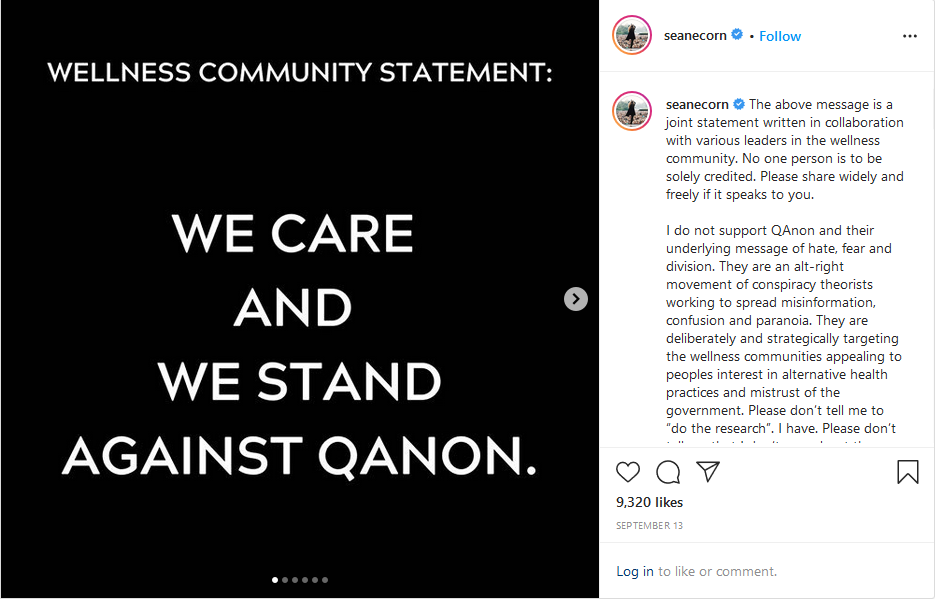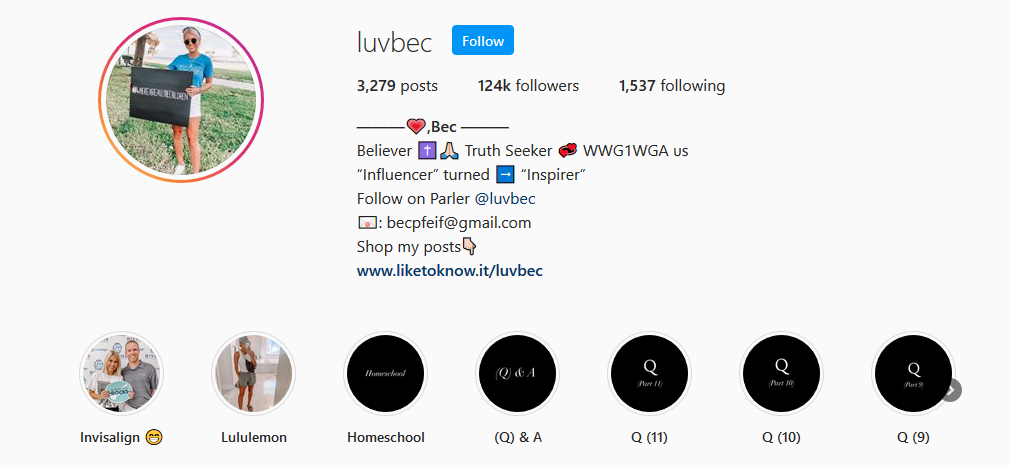Compass World: Quelling Qonspiracies
Denouncing QAnon was not part of their job descriptions. (Instagram)
A group of online wellness influencers released a statement on September 14 voicing concerns over the spread of QAnon in their community. A far-right conspiracy theory that erroneously claims insider knowledge of the Trump administration, QAnon has recently experienced an immense surge in popularity. It rapidly proliferated into mainstream online platforms, and previously not-very-political communities—like the wellness community—saw increased support for QAnon among their membership. While no substantial follow-up to the influencers’ post has been made at the time of this article’s publication, the increasingly mainstream and trans-national growth of QAnon is evident.
Qore Beliefs: Defining QAnon
Breathing exercises. Green smoothies. Essential oils. And, of course, a conspiracy theory based on the belief that President Donald Trump is a quasi-messianic figure fighting against a child-trafficking cabal run by society’s elites. The QAnon conspiracy theory, a far-right fringe belief, is now less of a conspiracy and more like a cult: once confined to less visible forums like 4chan and 8kun, QAnon can now easily be found on mainstream social media platforms including Twitter, Facebook, and Instagram.
Rooted in a series of 8kun posts from October 2017, this “conspiracy theory” is, in fact, a sprawling (and often vague, self-contradictory) umbrella theory for many distinct, yet ideologically interconnected, conspiracy theories originating from the far right. For example, QAnon theories borrow from 2016’s “Pizzagate” conspiracy theory, which falsely claimed that liberal political elites like Hillary Clinton are running a child-trafficking ring from a pizzeria in Washington, D.C.
These conspiracy theories are organized and narrativized by an anonymous poster simply known as “Q” (hence the name, “Q Anonymous”), who claims to be privy to sensitive government intelligence. Here, Q posts “Q droppings” on 8kun, which generally claim that Trump is working to dismantle a “deep-state” child-trafficking ring managed by society’s elites. QAnon followers predict that this secret crusade against child-trafficking will end with the Great Awakening, when pedophile elites will face retribution and Trump will arise, victorious.
In the context of the COVID-19 pandemic, QAnon followers often dismiss the pandemic as “a hoax” and express suspicion towards vaccination, public health officials, and precautionary measures such as mask-wearing. If this all sounds a little too unbelievable, it is. But people really believe it, and it can no longer be dismissed as a “fringe” conspiracy.
That’s Qute: QAnon goes mainstream
What was once confined to far-right forums is metastasizing into a broader social movement. As mentioned, it has even infiltrated the online wellness community, which consists of online “influencers” such as yoga practitioners, alternative medicine advocates, spiritualists, and self-help gurus. In response to QAnon’s growing traction in their community, a group of wellness influencers took to their social media platforms to speak out against it.
In a post by Seane Corn, a yoga teacher and Instagram wellness influencer, a group of wellness influencers sounded the alarm at their peers’ increasing acceptance of QAnon conspiracies: “QAnon is taking advantage of our conscious community. We are clear—QAnon does NOT represent the true values of the wellness community.”
In the caption below the post, Corn and her co-writers elaborated that QAnon’s focus on the elite-run child-trafficking ring is a product of QAnon’s “manipulative messaging” and “misinformation” that preys upon the wellness community’s vulnerabilities. When interviewed about her post by the New York Times, Corn noted, “I’m afraid that well-meaning folks who don’t understand the complexity of this misinformation will be seduced [by QAnon]. They’re rolling out the yoga mat right now, and it scares me.”
This phenomenon is not confined to the wellness community. In fact, QAnon is growing in popularity among women who are online influencers. Dubbed “Pastel QAnon” by researcher Marc-André Argentino, a QAnon expert, the women-led “Pastel QAnon” sphere repackages violent and radical ideological underpinnings of QAnon to make it more “palatable” for its audience. Using pastel color palettes and graphic designs that appeal to the “millennial-oriented… beauty-brand marketing,” QAnon’s image is reinvented as more acceptable and, simply put, mainstream.
For instance, the New York Times reported that the QAnon “hijacked” the #SaveTheChildren and #SaveOurchildren hashtag as a strategy to catapult their message into the mainstream—and, from the mainstream, into the world.
The influencer has Instagram highlights dedicated to explaining QAnon. (Instagram)
The influencer is also holding up a sign that says #WeAreAllTheChildren, a nod to the #SavetheChildren hashtag. (Instagram)
The TakeQover? QAnon’s Future
Despite its distinctly American roots, QAnon has gone global. Argentino estimates that it now has adherents in 71 countries, with significant numbers found in Germany, the United Kingdom, Australia, and Canada. While the exact reason for its international appeal is unclear, it may be connected to the fact that Trump has explicitly praised its adherents.
Trump’s endorsement, however, stands in sharp contrast to American tech companies and parts of his own government. The FBI now identifies QAnon as “a domestic terror threat,” and prominent tech companies are increasingly targeting QAnon misinformation accounts. Given the international climate, however, QAnon is likely to grow. But if Trump loses to former Vice President Joe Biden in November, QAnon might have to change its messaging strategy to stay in the mainstream.



